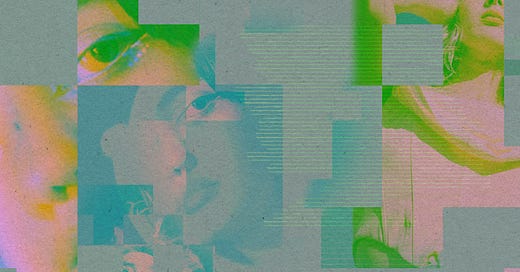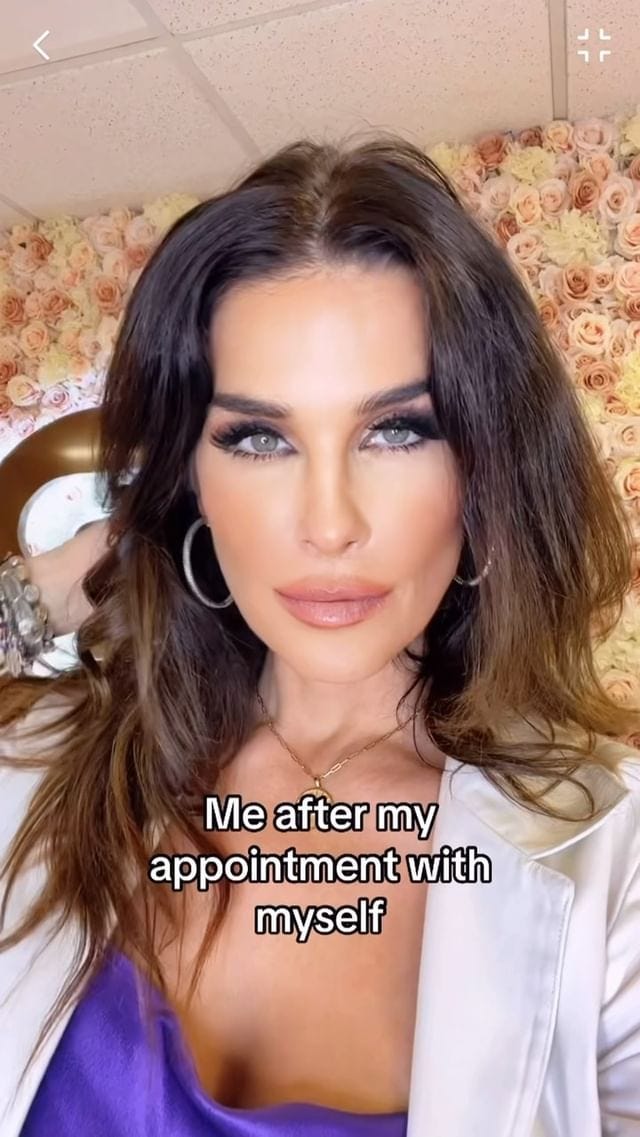The Legal Case Against Beauty Filters
I talked to MIT Technology Review about Meta's latest legal battle.
Last week dozens of states sued Meta, which owns Instagram and Facebook, claiming the company knowingly harms its users.
“The case grew out of an investigation triggered largely by Frances Haugen’s whistleblowing in 2021, which revealed damning evidence that Meta knew Instagram has detrimental effects on the mental health of young girls,” writes Tate Ryan-Mosley in her newsletter for MIT Technology Review, The Technocrat.
A number of those detrimental effects can be traced back to beauty filters.
She continues:
“As you probably know, one key aspect of the platform is filters that can easily be added to photos. The features range from basic editing tools to sophisticated real-time virtual-reality computer vision … The case against Meta specifically calls out visual tools ‘known to promote body dysmorphia’ as one of the ‘psychologically manipulative platform features designed to maximize young users’ time spent on its social media platforms.’ It also says that ‘Meta was aware that young users’ developing brains are particularly vulnerable to certain forms of manipulation, and it chose to exploit those vulnerabilities through targeted features,’ like filters.”
I jumped at the chance to chat with Ryan-Mosley about how virtual filters are changing our actual faces, how Instagram Face is influencing the medical system, and why (some of) the proposed photo-editing regulations probably won’t work. You can read an excerpt of our conversation below, or find the full thing over at MIT Technology Review here.
Tate Ryan-Mosley: The case asserts that there is evidence, a lot of which appears to be redacted, that shows Meta and Meta's products exploit young users and that the company is aware of the effect of their products on the mental health of young people, specifically teenage girls. What do you know about the evidence?
Jessica DeFino (me): From the standpoint of psychological health, there are definitely studies and surveys that show that teen girls specifically, but also women across the age spectrum, are experiencing higher instances of appearance-related anxiety, depression, body dysmorphia, facial dysmorphia, obsessive beauty behaviors, disordered eating, self-harm, and even suicide. And there's a lot that can be traced back in one way or another to this increasingly visual virtual world that we exist in.
On the more material side of things, there is a lot happening in the beauty industry that has been specifically inspired by Instagram. I think a really great example of this is the phenomenon of Instagram face, which is basically a term that’s been coined to describe the way that Instagram filters have inspired real-world procedures and surgeries.
I have interviewed a lot of cosmetic surgeons and cosmetic injectors over the years who tell me that patients use the filters and photo-editing tools that are really popular on Instagram, but maybe not owned by Meta or Instagram, to alter their own images and bring that in to a plastic surgeon or an injector consult and say, This is what I wanna look like.
I tell this story all the time because it was just so shocking to me and such a strong example of what’s happening in the medical world in response to Instagram filters: I was interviewing this cosmetic injector, a doctor and dermatologist named Anna Guanche, at an event hosted by Allergan, the makers of Botox Cosmetic, with a small group of journalists.
She said, “One of the biggest things I tell my patients is, ‘You want to look more like your filtered photos—what can we do to make you look more like them, so people don’t see you in real life and go, what?’”
So that is a medical opinion that’s being given by an actual doctor to clients. And of course, all of these behaviors and the surgeries that are being performed in response to Instagram filters come with a huge host of potential side effects and risks, including deaths.
These issues are often talked about in the context of women and teen girls being insecure about their bodies rather than framed as untested, mass-deployed, sophisticated consumer-facing augmented-reality tech. Have you seen that dynamic play out?
Issues [that affect] teen girls have historically been swept under the rug and dismissed. Things like beauty are seen as frivolous interests. And if they’re dismissed, we end up not getting enough studies, enough data about the harms of beauty culture, when in reality there are these huge and harmful cultural implications.
It recently came out that period products have never been scientifically tested using blood, and periods have been around since the beginning of time. If periods, which have affected teen girls and women for literal millennia, are understudied, it does not surprise me that this relatively new phenomenon of beauty filters and beauty standards affecting the mental health of teen girls does not have a robust set of data yet.
What in particular are you going to be watching as this lawsuit develops?
I would absolutely love to see more hard data on beauty standards and beauty culture and how social photo-editing technologies are contributing to that and their psychological impact.
But I’m more interested right now in the human behavior aspect of it. As evidence does come out in this lawsuit and we begin to see, Oh, these technologies that we’ve become obsessed with to an unhealthy degree are actually detrimental to our lives and our well-being in a lot of ways, I’m interested to see if people will, one, want to opt out of them and, two, be able to opt out of them. I’m interested to see if this lawsuit being more publicized will inspire more people to consider non-social-media lives.
As far as other potential regulations, there was one study done in the UK [that looked at] whether disclaimers on Photoshopped images had a positive effect on people who were viewing these advertisements. [Ed. note: Similar labels have been suggested as a regulatory response to social media harms.] And what it found is that in a lot of cases, the disclaimer that an image had been Photoshopped actually made people feel worse, because knowing that an image has been doctored and that it’s not physically possible doesn’t actually lessen the pressure society places on young women to look as perfect as possible. So I am very skeptical of any potential regulation that would require disclosure of filters or Photoshop or any sort of photo-editing things.
To keep up with the developing case against Meta, subscribe to Tate Ryan-Mosley’s newsletter with MIT Technology Review, The Technocrat.





Thank you for this! I’m hoping you can discuss SKIMS new “nipple bra” which unfortunately seems like another part of our bodies that is subject to scrutiny. This bra encourages a concept of what nipples should look like - doesn’t it? And now SKIMS has an official partnership with the NBA which is just going to give it more exposure. I may be way off base as I know we could probably dive into bras in general pushing unrealistic beauty standards, but the fake nipples just seems a step in the wrong direction. Or maybe I’m just a grumpy Xennial.
Brilliant, wonderful, thank you! What you're talking about here relates to my next post, too, about the trend of preadolescent and adolescent girls adopting multistep skincare routines. The lack of critical thought behind the trend astonishes me...though it shouldn't. xo